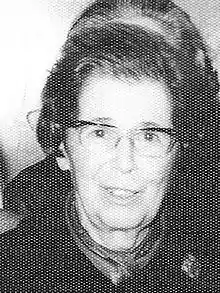Irene Bernasconi | |
|---|---|
 | |
| Born | Irene María Bernasconi 29 September 1896 |
| Died | 7 July 1989 (aged 92) |
| Nationality | |
| Occupation | Marine biologist |
| Years active | 1924–1984[1] |
Irene Bernasconi (29 September 1896 – 7 July 1989) was an Argentine marine biologist specializing in echinoderm research and best known for her work in the Antarctic.[2] She was the first echinoderm specialist in Argentina and spent 55 years conducting research into echinoderms found in the Argentine Sea. Her main focus was sea stars; however, she also conducted research into brittle stars and sea urchins.[1]
Work

Over the course of her career, Bernasconi described a number of new genera and species. Her first taxonomic publication, in which new species from the genus Pteraster were described, was published in 1935. In 1941 she described two new species from the genus Luidia. Between 1937 and 1980, Bernasconi revised the taxonomy of a number of families: Pterasteridae, Luidiidae, Odontasteridae, Gonisasteridae, Ganeriidae, Asterinidae and Echinasteridae. In 1965 she described the new genus of Vemaster along with four new species.[1]

Bernasconi was one of the first female Argentine scientists to conduct research in Antarctica after travelling there on 7 November 1968, and the first woman to lead an Antarctic expedition. She was aged 72 at the time.[3] She was accompanied by three other scientists - microbiologist Maria Adela Caria, marine biologist Elena Martinez Fontes and botanist Carmen Pujals.[4] These scientists are known as the "Four of Melchior" due to their association with the Melchior Base Antarctic station they conducted their research and expedition from.[5] They were the first group of female scientists to conduct research in Antarctica.[6]
The four scientists were in Antarctica for two-and-a-half months staying at Melchior Base on Gamma Island. They took water samples and collated examples of both deep sea flora and fauna. The findings also included mud and over 2,000 examples of Bernasconi's specialism of echinoderms.[7]
Recognition
In 1969 the "Embajada de Mujeres de América" (Embassy of Women of America) gave a commemorative medal to each member of the expedition.[8]
The group received numerous posthumous distinctions. When commemorating the 50th anniversary of the campaign, the Argentine Foreign Ministry, the Argentine Antarctic Institute and the National Antarctic Directorate, honored the scientists with four Antarctic place names approved by the Naval Hydrography Service: Pujals Bay, Cape Caría, Cape Fontes and Bernasconi Bay.[9]
On 11 February 2022, on the International Day of Women and Girls in Science, President Alberto Fernández renamed the Hall of Scientists of the Casa Rosada as the Argentine Science Hall, with "the Four of Melchior" included in a display of honored Argentine women scientists. A photograph of Bernasconi was added to the image gallery of the hall, along with those of 10 other women scientists from Argentina.[10]
She was the Google Doodle on 7 November 2022, which pictures her next to starfish, her main focus.[11]
References
- 1 2 3 Alvarado,Juan José; Solis-Marin, Francisco Alonso (2012). Echinoderm Research and Diversity in Latin America. Springer Science & Business Media. p. 360. ISBN 978-3-642-20051-9.
- ↑ "Bernasconi; Irene (1896–1989); Marine biologist". Natural History Museum. Retrieved 24 October 2015.
- ↑ "Celebrating Irene Bernasconi". www.google.com. Retrieved 7 November 2022.
- ↑ Riffenburgh, Beau (2007). Encyclopedia of the Antarctic, Volume 1. Taylor & Francis. p. 1094. ISBN 978-0-415-97024-2.
- ↑ MuseoARGcn. "Las Cuatro de Melchior". Museo Ciencias Naturales (in Spanish). Retrieved 7 November 2022.
- ↑ Ferraro, Daiana Paola; Cabo, Laura Isabel De; Libertelli, Marcela Mónica; Quartino, María Liliana; Clérici, Laura Chornogubsky; Tancoff, Soledad; Davies, Yolanda; Cruz, Laura Edith (20 November 2020). "Mujeres científicas del Museo Argentino de Ciencias Naturales: "Las Cuatro de Melchior"". Revista del Museo Argentino de Ciencias Naturales. Nueva Serie (in Spanish). 22 (2): 249–264. ISSN 1853-0400.
- ↑ Magazine, Smithsonian; Kiniry, Laura. "Ten Pioneering Women of Antarctica and the Places Named for Them". Smithsonian Magazine. Retrieved 7 November 2022.
- ↑ Ferraro, Daiana Paola; Cabo, Laura Isabel De; Libertelli, Marcela Mónica; Quartino, María Liliana; Clérici, Laura Chornogubsky; Tancoff, Soledad; Davies, Yolanda; Cruz, Laura Edith (20 November 2020). "Mujeres científicas del Museo Argentino de Ciencias Naturales: "Las Cuatro de Melchior"". Revista del Museo Argentino de Ciencias Naturales. Nueva Serie (in Spanish). 22 (2): 249–264. ISSN 1853-0400.
- ↑ "Homenaje a las primeras científicas argentina en la Antártida". www.cancilleria.gob.ar (in Spanish). Retrieved 7 November 2022.
- ↑ ""Queremos poner en valor el aporte de la mujer para el desarrollo de nuestra sociedad", dijo el presidente, en el Salón de la Ciencia Argentina". Casa Rosada (in European Spanish). Retrieved 7 November 2022.
- ↑ "Who is today's Google Doodle? First woman from Argentina to lead a marine expedition to Antarctica". www.scotsman.com. 7 November 2022. Retrieved 7 November 2022.